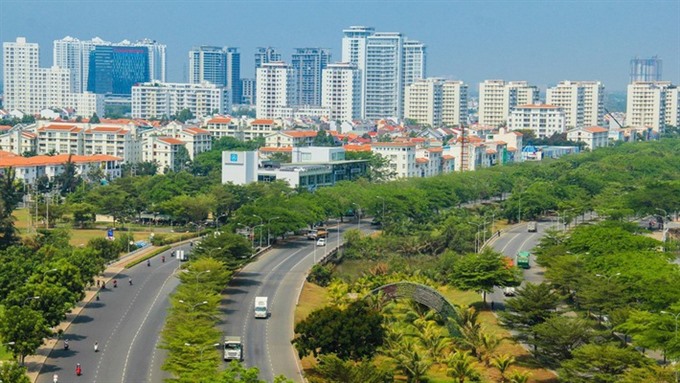The condominium market for sale showed signs of slowing down in the second quarter of this year, said Nguyen Hoai An, director of CBRE Viet Nam’s Ha Noi branch at a press conference on Wednesday to report on the capital city’s real estate market in the second quarter of this year.

The condominium market for sale showed signs of slowing down in the second quarter of this year, said Nguyen Hoai An, director of CBRE Viet Nam’s Ha Noi branch at a press conference on Wednesday to report on the capital city’s real estate market in the second quarter of this year.
In the second quarter, there were 6,534 units launched from 19 projects in Ha Noi, down by 20 per cent year-on-year. Launched projects in this quarter are mostly located in the West and North of the city, accounting for 53 per cent and 25 per cent of total new launched units, respectively.
Notably, there were three new projects in the high-end segment including D’Eldorado 2, Starlake and Vinhomes West Point, all located in a prime position, which drew positive market attention.
However, the share of the high-end segment increased from 15 per cent in the first quarter of this year to 37 per cent in the second quarter.
In terms of sales performance, 5,900 units were sold during the second quarter, down by 22 per cent from last year.
The second quarter of the year is the time when developers typically review current products and prepare for new products to launch at the end of the year. The slower launching speed also allows the market to absorb unsold units, An said.
In terms of pricing, the average selling price from developers in the second quarter of this year was recorded at US$1,332 per sq.m, down by 0.4 per cent quarter-on-quarter but up by 0.4 per cent year-on-year.
There were slight adjustments up and down from between 0.3 per cent and 1.5 per cent across different market segments during this quarter. The three abovementioned projects have increased the average primary price of the high-end segment by 1.5 per cent over last year.
The luxury segment in Ha Noi is quite small, so prices were unchanged. The mid-end and affordable segments were more competitive due to the large demand in the market, so prices fluctuated.
“This is a good signal because the market is stable. The second quarter of this year is considered as a period of adjustment in the Ha Noi property market before entering a new development stage,” said CBRE Viet Nam managing director Dang Phuong Hang.
In 2018, CBRE forecasted there would be 32,000 units launched in Ha Noi - a decrease of 10 per cent from 2017. The decrease in launched supply allows the market to absorb current inventory, which is a positive signal for the market. This shows that developers are more experienced in developing residential projects and analysing market conditions, An said.
In the second quarter, many foreign investors also paid attention to Viet Nam’s property market, helping local investors raise capital, as lenders and foreign investors looked favorably on the real estate industry and interest rates of loans were on the rise, she said.
Remarkably, An said the local real estate sector has been under great pressure from the increase in interest rates of banking loans. Meanwhile, the State Bank of Viet Nam has increased the risk index of banking loans for the property sector from 150 per cent to 200 per cent. The risk index could surge to 250 per cent in 2019.
The State Bank would reduce the volume of short-term capital used for medium and long-term loans from 50 per cent to 45 per cent in 2018 and possibly to 40 per cent in 2019. Meanwhile, interest rates of banking loans for the property sector may increase by 1- 2 per cent due to higher pressure from other factors such as oil prices and the increase of the US dollar price, she said.
To deal with those difficulties in getting capital, property investors have diversified their capital mobilisation channels such as listing on the stock exchange and issuing international bonds, she said. Those have promised to be good channels to mobilise capital to help the investors not depend on the banking loans.
Regarding the market prospects, An said in the second half of this year, the Ha Noi market was expected to develop property products with diversification in scale, functions and landscape because the people’s demand for buying condominiums will continue to grow in the coming time.
The requirements of buyers at present are also different from seven to 10 years ago. Buyers typically have carefully considered property products before deciding to buy one property product. Therefore, the market is expected to have new property products using clean energy and smart home appliances in the future. The price may be stable with fluctuation at 1-3 per cent. — VNS





